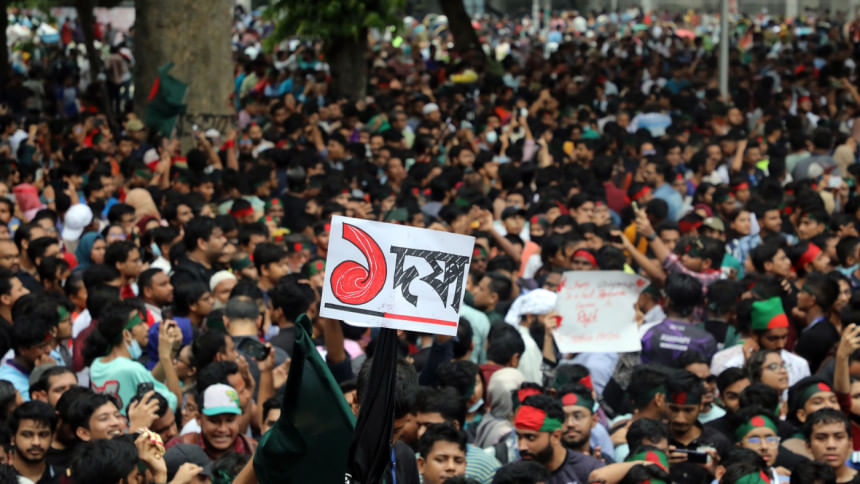
Last update on: Mon Aug 11, 2025 08:00 AM

When Sheikh Hasina’s Awami League government finally fell on August 5, 2024, after over 15 years in power, many saw this as the end of not just a regime but also its legacy of nepotism, elite capture, and weaponisation of bureaucracy. In its place, an interim government, strengthened by student leaders and civil society figures, promised a new beginning. But now, on the first anniversary of that momentous transition, we are left to confront a dispiriting paradox: the more things seem to change, the more they seem to remain the same.
To observe this trajectory is not merely to diagnose political stagnation; it is to confront a deeper malaise that grips the postcolonial state. The Bangladeshi polity, like many postcolonial entities, remains haunted by what Partha Chatterjee termed the “derivative nature” of its politics, importing forms of democracy and revolution without addressing their foundational preconditions: ethics, justice, and institutional integrity.
Instead of dismantling the Hasina-era architecture of inequality, the uprising appears to have inherited its scaffolding. The bureaucracy, once subservient to a party machine, remains largely unchanged, save for new masters who often replicate the performative gestures of the old. The passport office is still a Kafkaesque labyrinth; BRTA still delays issuing licences; roads are still cleared for convoys of newly minted VIPs—the list goes on. The “sir” culture persists not because of policy failure, but because it is rooted in a psychology of entitlement and feudal deference cultivated over generations.
What is equally disturbing is the appropriation of the movement’s moral capital by those who once fought under its banner. Many students who braved tear gas and rubber bullets in the name of justice now find themselves accused of replicating the very practices they once condemned. Extortion, influence-peddling, and administrative favouritism are no longer exclusive to career politicians; they have found new agents among the revolution’s own. This is what Hegel would describe as the “tragedy of history,” wherein noble ideas are often corrupted by the dialectic of power.
History offers many such warnings. The Bolshevik Revolution, once heralded as the dawn of proletarian emancipation, ossified into Stalinist terror. The post-Mubarak transition in Egypt collapsed into military authoritarianism. Even the French Revolution, perhaps the most emblematic of all, devoured its own architects in the Reign of Terror. In each case, the moral legitimacy of mass uprising was squandered by the inability—or unwillingness—of its leaders to reimagine governance beyond the idioms of control and domination.
The failure of Bangladesh’s post-July regime lies not in its slow pace of reform—radical change is rarely instant—but in its abandonment of ethical seriousness. What was meant to be a foundational rupture has congealed into a cynical continuity. The deeper structures of clientelism, bureaucratic aloofness, or institutional dysfunction remain unmoved. July, a symbol of defiance, is now turning into a brand rather than a beacon. The very mechanisms that animated resistance—solidarity, courage, and truth-telling—have been commodified.
Perhaps nowhere is this more visible than in the movement’s treatment of women. It was women who reignited the movement on the night of July 14, 2024, when they marched from Rokeya Hall in defiance of curfews and repression. Their audacity shifted the moral centre of the uprising. And yet, a year later, discriminatory rules still bind women within university halls, harassment on the streets remains rampant, and the societal reflex to rehabilitate predators with garlands of social forgiveness is unchanged. Simone de Beauvoir once warned that no revolution is truly revolutionary unless it transforms the condition of women. In this sense, the July uprising has not merely fallen short; it has betrayed its most courageous constituency.
It would, however, be too easy, and too comforting, to lay blame solely at the feet of the new leadership. The deeper problem is cultural and civilisational: our collective fascination with the theatre of change and our reluctance to pursue the rigours of transformation. The Bangladeshi elite, intellectual and political alike, have mastered the aesthetics of protest but remain averse to the ethics of reform. We chant slogans with lyrical passion but balk at the demands of justice when they challenge our privileges. Nor can we ignore the complicity of the populace. When civic memory is short and historical amnesia is encouraged, authoritarian residues thrive. When corruption is normalised as a tool of survival, and influence is celebrated as success, revolutions cannot endure.
It is time, then, to confront a painful possibility: that the July movement was never about systemic transformation, but about renegotiating power; that the anti-discrimination rhetoric was instrumental, not intrinsic; and that the struggle was less about eliminating privilege and more about redistributing it.
Still, all is not lost. The disappointment of the past year may yet serve as a crucible for a more serious reckoning. We must resist the temptation to romanticise revolutions or demonise reform. What is needed is a deep reimagining of the moral foundations of public life in Bangladesh. We must ask: What does it mean to govern ethically? What does it mean to dissent responsibly? What does it mean to rebuild institutions that serve, rather than dominate, the people?
Education, too, must rise to this challenge. Universities must become sites not only of resistance but also of reflection. Students must be taught not only to demand rights but also to practise justice. We must return to the basics of civic education as a collective pursuit of wisdom, integrity, and service.
To the young who marched last July, and dreamed of a Bangladesh without discrimination, let this be a reminder: that revolutions are not events—they are obligations. Their legitimacy lies not in what they destroy, but in what they dare to create. The golden Bengal we dreamed of was never going to be inherited; it must be built, word by word, act by act, truth by truth. And that work is not yet done.
H.M. Nazmul Alam is an academic, journalist, and political analyst. He can be reached at nazmulalam.rijohn@gmail.com.
Views expressed in this article are the author’s own.









